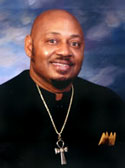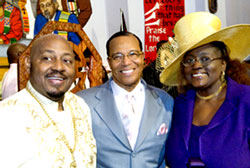ASKIAM and Nisa Islam Muhammad
Staff Writers

WASHINGTON (FinalCall.com) – The 33rd anniversary of Reverend Willie Wilson, pastor of Union Temple Baptist Church and executive director of the Millions More Movement, was another star-studded affair. The weeklong celebration featured some of the many “stars of spirituality” that guide Black congregations around the country.
Imagine spending a week in church with the likes of Rev. Dr. Iyanla Vanzant, of Inner Visions Worldwide; Rev. Dr. Marvin Sapp, from Grand Rapids, Mich., and Bishop Paul Morton Sr., of Greater St. Stephens Full Gospel Church in Atlanta. Add to that list Bishop Adam Richardson Jr., presiding prelate of Second Episcopal District of the African Methodist Episcopal Church; Rev. Darryl Winston, of the Church of Greater Works International and Rev. Sedrick Hamner of Greater Faith Church, both in Atlanta; and Rev. Dr. Jamaal Harrison Bryant from the Empowerment Temple in Baltimore.
Top that off with the crowning anniversary message given by the Honorable Minister Louis Farrakhan, Apr. 30 where he made a very special announcement. “I want my illustrious Brother, wife (co-pastor Mary Wilson) and this church to be the headquarters of a call to Black, Brown, Native American and poor Whites who want to be doctors,” explained Minister Farrakhan about the 500 scholarships Cuban President Fidel Castro has offered. “I trust my Brother to screen young people and make sure this is what they really want to do.”
Minister Farrakhan has become a Union Temple anniversary tradition. “I’m here as often as he would have me,” said the Muslim leader, visibly moved to tears. “I can’t deny him because he opened the doors of his church when no other Christian pastor would and he suffered because of it,” he recalled of the early days when he began rebuilding the Nation of Islam in 1977.

That was the beginning of a long friendship and brotherhood between these two freedom fighters whose relationship has served as examples of how Muslims and Christians can get along–and get along well. But then again, Rev. Wilson is not your typical Christian minister. He does have a portrait of a Black Jesus facing the congregation, along with other notable Black history-makers such as Mary McLeod Bethune, the Honorable Elijah Muhammad, Marcus Garvey, W.E.B Dubois and Harriet Tubman.
The history of Union Temple Baptist Church is filled with stories of legend. The late Rev. Chester Smallwood, father of Grammy Award-winning gospel artist Richard Smallwood, founded the tiny ministry in 1967. The church held its first meetings in a residence in the Southeast Washington neighborhood where the church now represents a commanding presence.
At the time of its founding, Rev. Wilson was working on his Master’s degree at the Howard University Divinity School. One day as he sat in class, the student preacher heard gospel music being sung on the campus quad, he recounted to attendees at the anniversary gala dinner Apr. 29 celebrating his 33rd pastoral anniversary.
The music, by artists including Donny Hathaway, Roberta Flack and Richard Smallwood, was part of a protest demanding the inclusion of Black gospel on campus. Back in 1969, however, Rev. Wilson pointed out, Howard University’s Divinity School curriculum did not contain or permit any emphasis on what has since become known as “Black Theology” or any other Black Christian traditions or religious scholarship.
Rev. Wilson–who earned the Vernon Johns Preaching Award for the most “Outstanding Orator and Preacher” of his graduating class–immediately joined the campus movement and began preaching. His crusade attracted people from the campus and street people, alcoholics and drug users from the neighborhood surrounding the school to hear his preaching.
When Rev. Chester Smallwood passed in 1971, at the request of Mrs. Smallwood, Rev. Wilson assisted reverends Simon Beamon and John Moss, preaching and teaching at Union Temple on weekends for 18 months until he was assigned to pastor the 30-member congregation on Feb. 25, 1973. When he assumed the leadership, Rev. Wilson brought two dozen students, associates and former substance abusers he had been counseling into the church, establishing the first ministry for drug and alcohol abusers at any Black church in the nation’s capital.
He also instituted a number of progressive, African-centered changes, including a “tribal system” designed to enhance spiritual development. With celebrations such as a “24-hour Marathon for Christ,” the church grew in reputation, popularity and size, moved into increasingly attractive locations, and purchased homes and rental property in the surrounding neighborhood as it grew. Union Temple now boasts over 8,000 members on its rolls.
Union Temple was the first Washington-area church to celebrate Kwanzaa or commission a painting of the first Black Christ. It was also the first Black church to institute an investment program, a “Rites of Passage Ministry” for children passing into adulthood and a Drill Team.
Rev. Wilson pointed out that Minister Farrakhan has been a counselor, advisor and role model for his ministry. “There are so many parallels,” that his pastoral career has with that of the Muslim leader, he added, noting Minister Farrakhan’s advice to purchase property around the church. As a result, the church now owns every property in the block surrounding the church, except one.
“Serving us as a people is not easy,” Minister Farrakhan said in brief remarks at the dinner celebration. “We are a people that would tax God. We are a people who, unfortunately, are ungrateful for the things that God blesses us with.”
“If we are grateful for small things, we won’t miss the big things. Being grateful to God is our first duty,” he pointed out, especially when God blesses people with such a “good shepherd” as Rev. Wilson.











